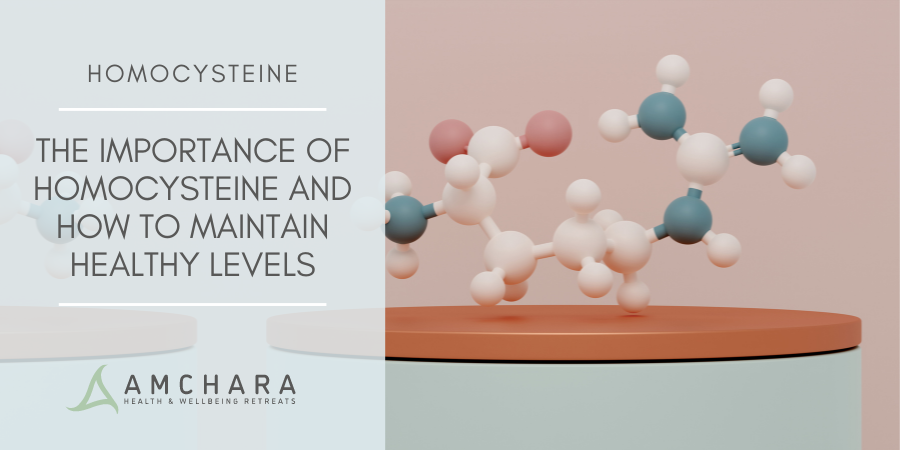Homocysteine is a sulphur-containing amino acid that is formed naturally in the body as part of the process that breaks down methionine, an essential amino acid obtained from dietary protein. So, homocysteine is not obtained directly from food, it is synthesised within the body through metabolic processes.
Our articles are always evidence-based approach and oriented to a Personalised Health approach, and we aim to provide you with actionable knowledge and tips to help you on your journey to optimal health.
In this article we’ll look at the why homocysteine is important, the implications of too much homocysteine, and what you can do to regulate and maintain healthy levels.
Why is homocysteine important?
Homocysteine plays a significant role in various biochemical pathways, particularly in the metabolism of methionine and the synthesis of cysteine (another essential amino acid). While it is crucial for these metabolic processes, elevated levels of homocysteine in the blood, known as hyperhomocysteinemia, have been associated with various health risks, making its regulation vital for maintaining health.
The role of homocysteine in the body
Methionine Cycle: homocysteine is part of the methionine cycle where methionine is converted into SAMe (S-adenosylmethionine), which is important for many bodily functions like DNA synthesis and repair, neurotransmitter regulation, and detoxification.
Transsulfuration pathway: homocysteine can be further metabolised through the transsulfuration pathway, where it is converted into cysteine, a precursor for glutathione, an important antioxidant that helps to protect your cells. This pathway requires vitamin B6 as a cofactor.
Remethylation pathway: homocysteine can be turned back into methionine which helps to keep the amino acids in the body balanced.. This process needs folate (vitamin B9) and vitamin B12 as cofactors.
Health implications of elevated homocysteine levels
Cardiovascular disease: elevated homocysteine levels are a well-known risk factor for cardiovascular diseases as high levels can damage the lining of arteries, promote inflammation, and enhance blood clotting, increasing the risk of heart attack, stroke, and other cardiovascular conditions.
Neurological disorders: high homocysteine levels have been linked to cognitive decline, Alzheimer’s disease, and other neurodegenerative disorders. Homocysteine can induce neurotoxicity, oxidative stress, and impaired methylation in the brain, contributing to these conditions.
Bone health: too much homocysteine can interfere with collagen cross-linking, resulting in a weakening of bone structure and increasing the risk of osteoporosis and fractures.
Pregnancy complications: high homocysteine in pregnant women is associated with an increased risk of complications such as preeclampsia, placental abruption, and fetal neural tube defects.
Nutrients to help regulate homocysteine levels
As homocysteine itself is not obtained directly from food, the regulation of its levels in the body depends on the adequate intake of several key nutrients:
Methionine: methionine is the amino acid precursor of homocysteine and is obtained from dietary protein sources such as meat, fish, dairy products, and legumes.
Folate (Vitamin B9): folate is crucial for the remethylation of homocysteine to methionine. Good dietary sources include leafy green vegetables, legumes, nuts, seeds, avocados, and fortified grains.
Vitamin B6: vitamin B6 is a cofactor in the transsulfuration pathway, aiding in the conversion of homocysteine to cysteine. It can be found in foods such as poultry, salmon, potatoes, chickpeas, and bananas.
Vitamin B12: vitamin B12 is essential for the remethylation of homocysteine and is primarily found in animal products such as meat, particularly beef liver, fish, clams, eggs, and dairy products.
Choline and betaine: choline, found in eggs, meat, and certain vegetables, can be converted to betaine in the body. Betaine helps regulate homocysteine levels.
Foods rich in multiple B vitamins (B6, B9, and B12)
Eggs: provide a good amount of B12 and a moderate amount of B6 and folate, supporting brain function and cell health.
Fortified cereals: many cereals are fortified with B vitamins, including B6, B9, and B12, making them a convenient source of these nutrients.
Chickpeas: rich in vitamin B6 and folate, supporting immune function and heart health.
Nutritional yeast: often fortified with B12 and provides B6 and folate, suitable for vegetarians and vegans.
How to incorporate these foods into your diet
Chicken and salmon: grill or bake for a healthy main dish.
Bananas: eat as a snack or add to smoothies and breakfast cereals.
Spinach and avocado: use in salads, sandwiches, or as side dishes.
Lentils: cook into soups, stews, or salads.
Beef liver and clams: prepare as part of a balanced meal with vegetables and grains.
Eggs: enjoy boiled, scrambled, or in omelettes.
Fortified cereals: choose for breakfast or as a snack with milk or yogurt.
Chickpeas: add to salads, make hummus, or include in stews.
Nutritional Yeast: sprinkle on popcorn, pasta, or incorporate into sauces.
By including these foods in your diet, you can ensure a good intake of vitamins B6, B9, and B12, which are essential for maintaining overall health and preventing deficiencies.
Why these nutrients are important
Vitamin B6: supports cardiovascular health, energy metabolism, neurotransmitter synthesis and brain health, and immune function.
Vitamin B9 (folate): helps to support energy levels, DNA synthesis, cell division, supporting red blood cell formation, reducing inflammation, and preventing neural tube defects in pregnancy.
Vitamin B12: crucial for red blood cell production, nerve health, neurological function, energy levels, and DNA synthesis.
Maintaining healthy homocysteine levels
To ensure healthy homocysteine levels, it is essential to:
Maintain a balanced diet: consume a varied diet rich in vitamins B6, B9 (folate), and B12 to support the efficient metabolism of homocysteine.
Regular monitoring: individuals at risk, such as those with a family history of cardiovascular disease or neurodegenerative disorders, should have their homocysteine levels monitored regularly through blood tests.
Supplementation: if dietary intake is insufficient, especially in populations such as vegetarians, vegans, or the elderly, supplementation with B vitamins may be necessary under medical guidance.
Healthy lifestyle: regular physical activity, stopping smoking, and limiting alcohol intake can also help maintain healthy homocysteine levels.
Takeaway
Homocysteine is a crucial intermediate in amino acid metabolism, and maintaining its levels within a healthy range is vital for cardiovascular, neurological, and overall health.
Adequate intake of methionine and B vitamins through diet and, if necessary, supplementation, along with healthy lifestyle choices, are key strategies in regulating homocysteine levels and mitigating associated health risks.
If you would like to find out more about optimising your health, our Amchara detox health retreats are designed to help you both physically and mentally.
At Amchara we offer a range of fasting options to boost your detox, which you can choose from in consultation with our Personalised Health practitioners, to ensure you are choosing the option that is appropriate for your health circumstances and goals.
On an Amchara health retreat you will be immersed in a supportive and nurturing environment, combining a Functional Medicine and naturopathy approach, that enables you to switch off, relax and kickstart your health journey.
Our Personalised Health practitioners will support you, recommending positive, sustainable lifestyle choices tailored to your individual health circumstances and goals, and empower you to ‘Change for Good’.




